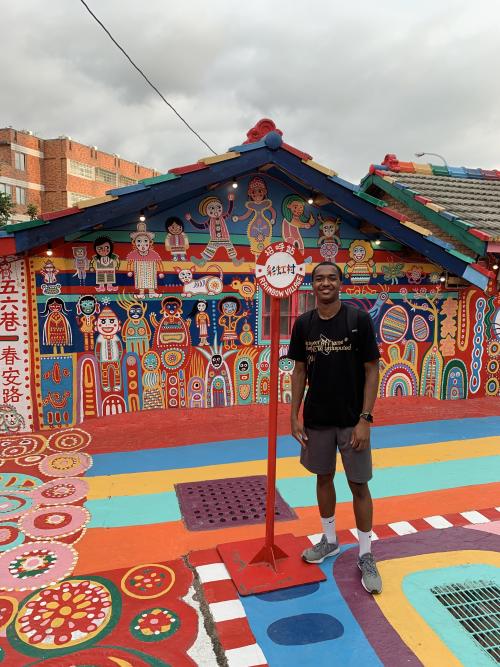
Every Second is a Learning Opportunity
Recently, we caught up with Cole Walker (Trinity ’23) to learn more about his experience in Summer 2022 as one of the first Duke University recipients of the Huayu Bilingual Exchange of Selected Talents (BEST) scholarships from National Tsing Hua University (NTHU) in Hsinchu, Taiwan. APSI collaborated with NTHU to make this summer language program available to Duke students. Students enrolled in this program at NTHU have 15 hours of Chinese language instruction each week alongside additional opportunities to engage in service-learning activities. Following his graduation from Duke, Cole is headed to Beijing as a 2023-24 Schwarzman Scholar.
The following transcript has been edited for length and clarity.
APSI: How did you become interested in studying Chinese language?

(photo courtesy of Cole Walker)
Cole Walker: It started for me in fourth grade. My elementary school decided to offer Rosetta Stone for students, allowing us to choose which language we wanted to learn. I really liked Chinese food as a kid and was fascinated by the cultural aspects, but I didn’t know much about China. With encouragement from my parents, I chose to take the risk and start learning Mandarin. This was in 2012, four years after the Olympics, so it was a very optimistic time in US-China relations.
Things have come full circle given that I’m teaching Mandarin to some fourth and fifth graders at a local Durham charter school, and the curriculum is very similar to what was taught to me when I was in fourth grade. I’ve been teaching Mandarin as a part of a six-week after-school initiative that my fraternity, the Kappa Omicron Chapter of Alpha Phi Alpha Fraternity, Inc., started this year to teach Mandarin and STEAM [Science, Technology, Engineering, Arts, Math]. We’re students of color, and we were fortunate enough to have the [opportunity] to learn Mandarin and STEM at early ages, so we want to give back and pay it forward to kids from underrepresented groups like us.
I really got serious with my Mandarin studies in high school. I was able to do a study abroad exchange program during my junior year where we hosted a student in my house in the spring, and then I stayed with a host family in Beijing over the summer. I was also able to travel to Shanghai and Suzhou as well. When I got to Duke, I wasn’t intimidated by Mandarin, because I’d been taking it for a while and was absolutely going to continue with it. On top of that, having my experience in Taiwan last summer changed everything and inspired me to embrace being a lifelong learner but also to teach others as well.
APSI: What was it like to study in Taiwan in summer 2022?
Cole Walker: It was amazing. It was a life-changing experience and was a phenomenal two months.

(photo courtesy of Cole Walker)
When I first got to Taipei, I had to deal with the quarantine hotel. It was chaos trying to get from the airport, but as soon as I got in the car, I started speaking with the taxi driver, Mr. Wang, and had an amazing conversation. I really enjoyed getting the opportunity to practice my Mandarin in such an immersive environment and this conversation set the stage for how I wanted the rest of my trip to go.
From that moment, I was going to be intentional: I was going to have meaningful conversations with whoever I met. I reminded myself, “that’s going to be the norm. That’s going to be how I want things to play out.”
I spent the first week and a half in quarantine, then explored Taipei on my own. It was exhilarating to take the MRT subway to random stops and explore different neighborhoods, especially the night markets.
Again, you’re alone. You have to figure stuff out. I befriended some people just randomly standing in line at boba places and even climbed to the top of a mountain to look out and see the skyline of Taipei. That picture is still my phone background right now; there were so many amazing memories from the experience.

(photo courtesy of Cole Walker)
I reunited with the rest of the Duke cohort when I arrived on NTHU’s campus. I had already known three of the four students before coming to Taiwan and two of them were actually in my Duke LLC [living-learning community]. One of them was already a close friend. It was great. I went from being a solo traveler, which built my confidence on how to navigate Taiwan, to being in a group setting, and we stuck together a lot. We’d have lunch together on most days and we’d go on excursions and weekend trips together. Our teacher in the program encouraged us to learn outside of the classroom. We had the opportunity to travel all over the island, which was amazing.
I had the chance to experience the different culinary aspects of Taiwan’s many local flavors, and cultural highlights included attending a Hualien County aboriginal festival and a ghost festival parade in the streets of Hsinchu.
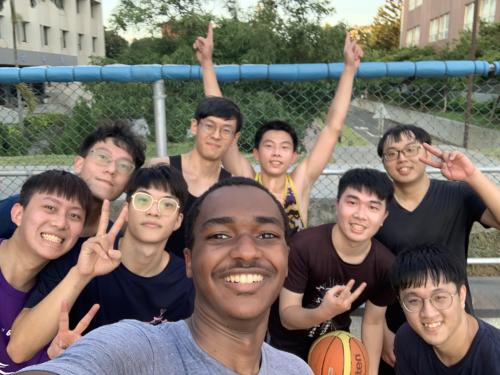
(photo courtesy of Cole Walker)
I was surprised by the number of NTHU students who ended up staying on campus over the summer, and really enjoyed playing basketball with what seemed like a new group of students every day. After each day of playing, I’d take a selfie with the guys I met and we would exchange Instagram and LINE accounts. I’ve been able to stay in touch with some of them to this day.
Throughout the trip, our cohort interacted closely with the NTHU Office for Global Affairs’ leadership team and their student volunteers, who we hung out with a lot. As a part of the office’s programing, we went to theme parks, explored cultural sites around Hsinchu, trained in Wing Chung martial arts, and learned cool calligraphy techniques. I really enjoyed getting the chance to build friendships with the NTHU students that participated in this programming with us.
APSI: Describe some of the differences between studying Chinese in the U.S. and in a native-speaking environment like Taiwan.
Cole Walker: Every second is a learning opportunity when you’re in an immersive environment like Taiwan.
Learning in the classroom is no doubt fulfilling. The progress I’ve made from when I first arrived at Duke to now has been incredible. I’m super happy with that, and I attribute it to how much my professors care and how passionate they are. However, in my opinion, the traditional classroom environment can’t give you that fully immersive experience. Learning in the classroom helped me build up the critical foundational skills that I could apply to more immersive situations.
All of those dictations, class essays, and presentations were certainly tedious in the moment, but they paid off when I arrived in Taiwan. It was so empowering to be able to order food and buy essential items at stores off campus as soon as I arrived. Knowing the language was quintessential to my Taiwan experience. I wasn’t about to go into shops and start speaking English to people, because there’s no value in that. Most people wouldn’t have been able to understand me, anyway. You had to speak the language to get by, and I think that was the best part. It pushed me in ways that I really wanted to be pushed in so that I could grow as a person, but also in my ability to speak Mandarin.
APSI: How do you think developing your language skills has enhanced your public policy studies?
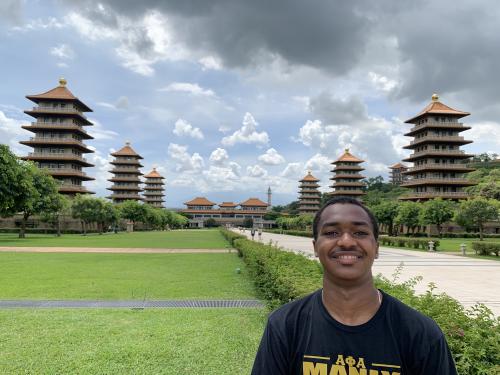
(photo courtesy of Cole Walker)
Cole Walker: One opportunity was really cool. Carolyn Lee, head of the Duke Chinese program, reached out to see if I wanted to take any supplemental classes. I was initially hesitant because I wanted to focus on studying for my [language] class and to have more free time to explore [Taiwan].
However, I eventually decided to go through with it, and I’m so happy with my decision to do so. Prof. Lee put me in contact with a local instructor that was based in Hsinchu, who spent a year in the US as a visiting scholar. She was amazing. We had sessions every week for about an hour and a half, and she told me a lot more about Taiwan’s local politics, the different parties, the history of the parties’ political strongholds, what happened in the 2016 election versus the 2020 election, and what may take place in the upcoming 2024 election. I was also introduced to identity politics in Taiwan and the fascinating distinction between the Han Chinese people who came in 1949 versus the Han Chinese who had been on the island for hundreds of years, like the Hokkien and Hakka people. We also discussed the experiences of Taiwan’s aboriginal people as well as the more recent immigrants from Southeast Asia. I learned about how these different groups have interacted with one another and how politics can bring them together and create dividers

(photo courtesy of Cole Walker)
I even organized a project where I photographed political campaign posters across the island. The instructor had me analyze and translate each sign’s slogans so that I could understand why each politician chose to use specific phrases. This is the same kind of work that political scientists in the US do, so engaging in this work in the Taiwanese context, with its complex history and politics, really helped make me a better policy analyst. I think that’s a critical component of Duke’s Public Policy department in general.
APSI: Please tell us about your work for the Black China Caucus.
Cole Walker:
I’ve been working as the Black China Caucus’ Outreach Coordinator for just under a year now. Last April, I met with the organization’s Co-Founder, Mark Akpaninyie, a Duke alum who graduated in 2012. I had known Mark through our involvement in the National Association for Black Engagement with Asia (NABEA) and through Duke alumni outreach networks. He reached out to me with an opportunity for the summer – a chance to expand a program idea that he called “China 101.” The program is designed to increase the pipeline of Black young professionals, undergraduate, and graduate students entering the China professional space, where we are clearly underrepresented.
We, as the Black China Caucus (BCC), want to change this trend, and it starts with providing resources to people like me – undergraduates who are looking for jobs and opportunities, who may have insight, knowledge, and strong interest but may not have critical resources or a supporting organization to help us find those opportunities. No one in my family speaks Chinese and only a few of my family members know much about China at all, outside of having conversations with me. Having organizations like the BCC is essential as it provides a strong community of people who know and understand the challenges of engaging in China-related work as a Black person.
Over the summer, I was charged with trying to take the idea of the China 101 program and turn it into reality. While I was in Taiwan, I worked remotely with the organization. I first researched existing programs organized by other similar organizations to get a feel for what was already being done and for how China 101 could address potential gaps in this programming. I then created a framework called NODE - Networking, Opportunities, Development, and Exposure - which represent the critical tenants for the revamped China 101 program. I also reached out to groups of students that were in a similar position – one at Morehouse, one at UNC – to receive their feedback on my programming idea and ensure that it could meet our specific needs as Black students engaging with Mandarin and China studies.

(photo courtesy of Cole Walker)
Since returning from Taiwan, I publicized the China 101 program to organizations and universities across the country, gaining a great group of program participants. The program has successfully kicked off as a listserv that provides information about internships, fellowships, jobs, professional development events, and resources that will enhance participants’ exposure to opportunities pertaining to China.
I initially didn’t see myself as an entrepreneur, someone who invents things. But I actually invented something, and now I’m seeing it through. Balancing my classes and other extra-curricular commitments with this [initiative] has been really challenging, but it’s also been empowering. I’m excited about where the program’s going, and I hope it stays with the BCC for a long time. When the time comes for me to move on, I’ll pass it on to the next person so that they can continue the legacy of China 101 and make a positive impact in the community.
APSI: What are your plans after completing your study in China as a Schwarzman Scholar?
Cole Walker: I've always been interested in the idea of diplomacy, but I think we often confuse diplomacy as just being “Big D” diplomacy, like working for the US State Department, or working for your country's respective government department or ministry. But I think we forget that diplomacy is much broader and can also include what I’d call “little d” diplomacy. I’m especially interested in the idea of subnational diplomacy, the smaller-scale initiatives that involve province to state relationships or even city-to-city ones.
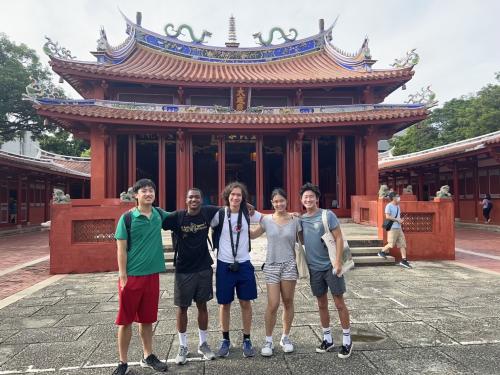
(photo courtesy of Cole Walker)
When I was in Taiwan, I was fascinated by the efficiency of the MRT subway system. It was incredible. I fell in love with it because walking to the stations was so convenient and the trains were so time efficient. I had my routine. I'd arrive at a station, and get halfway across the city in minutes. As a native Atlantan, our system, known as MARTA, isn’t as expansive nor efficient as Taiwan’s MRT. I actually just wrote a memo for my Public Policy 301 class about this issue. I found that there are political, economic, and technical capacity constraints that are preventing MARTA from being able to expand into other surrounding counties in the metro area or to make critical infrastructure improvements outside of federal support. So, how can the city of Atlanta learn from what's happening in Taipei with MRT? How can Taipei, which still struggles with its air pollution, learn from some American cities, or even European cities that have done a great job mitigating the effects of climate change and implementing ways to make life more bearable for people living in the city? These are the kinds of questions that I’d love to explore throughout my career.
For this kind of collaboration, you need people who have both a cultural understanding of Asia and a strong awareness of the American context. They need to be able to play a critical middle-ground consultant role between culturally and politically different parties and make opportunities for collaboration possible. After my Schwarzman experience, whether working as a foreign service officer, a public or private sector consultant, or for an NGO, I hope to directly impact policy and business geared towards fostering a more productive US-China relationship. I would be able to leverage my unique experiences, travel throughout Asia, and work directly with communities.
APSI: What would you say to other young people who are studying (or thinking about studying) Chinese?
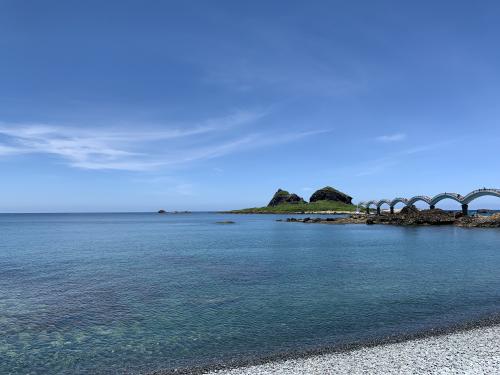
(photo courtesy of Cole Walker)
Cole Walker: Don't give up. Don't quit. It's not easy. I've had plenty of tough days, especially in middle school. I was really on the verge of quitting afterseventh grade. It was just so hard. I kept telling myself, “What is going on? This is so hard!” I really liked my teacher, but at the same time, I felt like the class was too hard for me. Yet despite these initial doubts, I stuck with it. I learned that my teachers believed in me.
I eventually built up that confidence in myself, saying, “I can do this.” For the people who are taking Chinese in middle school and high school right now but are concerned about the time commitment, I'd say don't quit when you’ve already invested so much into learning Chinese already. It's worth continuing. You've already invested a lot of time and energy into it, and clearly you have some passion for it.
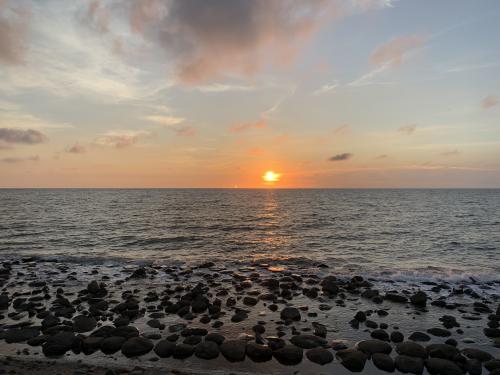
(photo courtesy of Cole Walker)
When you get to college, I believe the experience only gets more meaningful, and there are opportunities for you to travel abroad, usually with significant financial support. There's so many amazing opportunities out there, and they're constantly looking for people. But you have to look around for them. Others have given me this advice over the last few years, so I'm happy that I can do the same thing for students learning Mandarin and trying to make similar decisions.